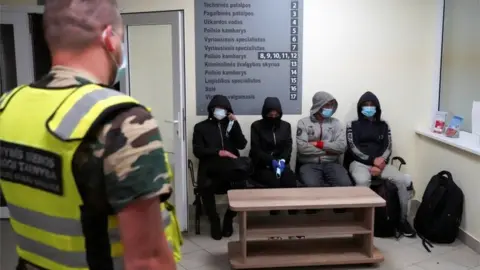Lithuania votes to curb influx of migrants from Belarus
 Reuters
ReutersLithuania has voted in favour of strict new migration laws amid an influx of arrivals from Belarus.
Politicians backed the controversial legislation on Tuesday, allowing the mass detention of migrants and limiting their right to appeal.
It comes as hundreds of migrants have illegally crossed into Lithuania from Belarus in recent weeks.
Lithuania accuses Belarus of flying in foreign migrants who then head to the border, a claim Belarus denies.
More than 1,700 people have been detained at Lithuania's border this year. The EU country has deployed troops and begun building a 550-km (340-mile) razor wire fence along the border with Belarus, which is not a member of the bloc.
Relations between the two countries worsened in 2020 after President Alexander Lukashenko won disputed elections and launched a violent crackdown on demonstrators.
Opposition figures including Svetlana Tikhanovskaya, who claimed victory in that election, fled to Lithuania shortly after the vote.
Relations deteriorated further in May this year after the Belarusian dissident Roman Protasevich was arrested.
He and his girlfriend Sofia Sapega were flying from Greece to Lithuania when a Belarusian fighter jet escorted their plane to Minsk airport, over a fake bomb threat. They were detained as soon as the Ryanair flight landed.
Western nations - who accuse Mr Lukashenko of rigging last year's election - have imposed further sanctions against his government in the wake of Mr Protasevich's arrest.
Mr Lukashenko has rejected the allegations.
Introducing the bill in parliament, interior minister Agne Bilotaite said the migrants were "not real asylum seekers" but instead a "tool to use against Lithuania" by Mr Lukashenko.
She also said it would "send a message to Iraqis and others that this is not a convenient route".
The law bans migrants' release from detention for six months after their arrival. It will allow a speedier process for deporting migrants, limits their ability to appeal, and even allows people to be deported during their appeal process.
Lithuania's Foreign Minister Gabrielius Landsbergis said the migrants were "being sent on a compulsory basis as a weapon against us".
But rights groups have criticised the law. Lithuanian Red Cross director Egle Samuchovaite told Reuters news agency that the legislation was a "potential human rights violation".
